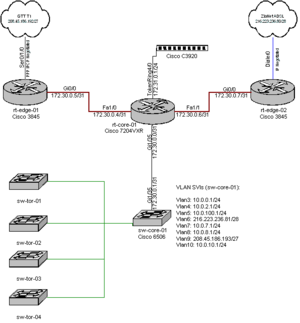Difference between revisions of "Category:Network Hardware"
Jump to navigation
Jump to search
| Line 5: | Line 5: | ||
=== Data Network === | === Data Network === | ||
The Datashed network is designed around the following rough organization: | The [[:Category:1DCA|Datashed]] network is designed around the following rough organization: | ||
* Each rack has one or more top-of-rack Ethernet switches. All of these are Foundry FastIron Edge models (2 x448, 1 4802). | * Each rack has one or more top-of-rack Ethernet switches. All of these are Foundry FastIron Edge models (2 x448, 1 4802). | ||
| Line 15: | Line 15: | ||
* The core router is also connected to the ChivaNet router, [[rt-chivanet-01]], which acts as a firewall, router, and NAT device for ChivaNet WISP clients. | * The core router is also connected to the ChivaNet router, [[rt-chivanet-01]], which acts as a firewall, router, and NAT device for ChivaNet WISP clients. | ||
* VPN access from the outside is provided by a Cisco ASA-5520, called [[fw-edge-01]]. | * VPN access from the outside is provided by a Cisco ASA-5520, called [[fw-edge-01]]. | ||
* The house has a closet, called the [[:Category:IDF|IDF]], which contains [[sw-tor-04]], a Foundry FastIron Edge x448, uplinked to the datashed by way of 2x Cat5e cables running through conduits (this is changing soon). | * The [[:Category:House|house]] has a closet, called the [[:Category:IDF|IDF]], which contains [[sw-tor-04]], a Foundry FastIron Edge x448, uplinked to the datashed by way of 2x Cat5e cables running through conduits (this is changing soon). | ||
* The IDF also contains an Arris DOCSIS modem/router, which handles connectivity to the Internet for non-hosting devices through [[Xfinity Cable]]. | * The IDF also contains an Arris DOCSIS modem/router, which handles connectivity to the Internet for non-hosting devices through [[Xfinity Cable]]. | ||
Revision as of 08:19, 13 April 2019
This page is a stub. You can help by expanding it.
Summary
Data Network
The Datashed network is designed around the following rough organization:
- Each rack has one or more top-of-rack Ethernet switches. All of these are Foundry FastIron Edge models (2 x448, 1 4802).
- The ToR switches connect to the core switch, sw-core-01, via redundant multimode fiber optic links.
- The core switch does inter-VLAN routing for the entire network.
- The core switch is also uplinked to the core router, rt-core-01.
- The core router can get packets to and from the non-Ethernet segments of the network (Token Ring, ATM, FDDI, etc.), as well as to the edge routers.
- The edge routers handle connectivity to the Internet, via the GTT T1 line on rt-edge-01 and the ZiaNet ADSL on rt-edge-02.
- The core router is also connected to the ChivaNet router, rt-chivanet-01, which acts as a firewall, router, and NAT device for ChivaNet WISP clients.
- VPN access from the outside is provided by a Cisco ASA-5520, called fw-edge-01.
- The house has a closet, called the IDF, which contains sw-tor-04, a Foundry FastIron Edge x448, uplinked to the datashed by way of 2x Cat5e cables running through conduits (this is changing soon).
- The IDF also contains an Arris DOCSIS modem/router, which handles connectivity to the Internet for non-hosting devices through Xfinity Cable.
Top-Of-Rack Switches
Edge Routers
Core Router
ChivaNet Router
Voice Network
The voice network is built around an AT&T Merlin Legend PBX:
- Connectivity to the house is provided by 2x 25-pair Cat3 cables, running through conduit.
- The cross-connect fields are 66 blocks, as I prefer them to 110 blocks for various reasons.
- The outside line, from CenturyLink, is a POTS Line.
Pages in category "Network Hardware"
The following 9 pages are in this category, out of 9 total.
